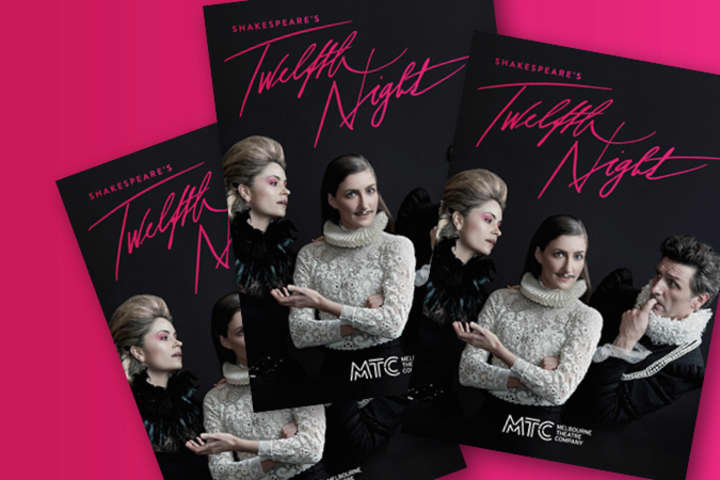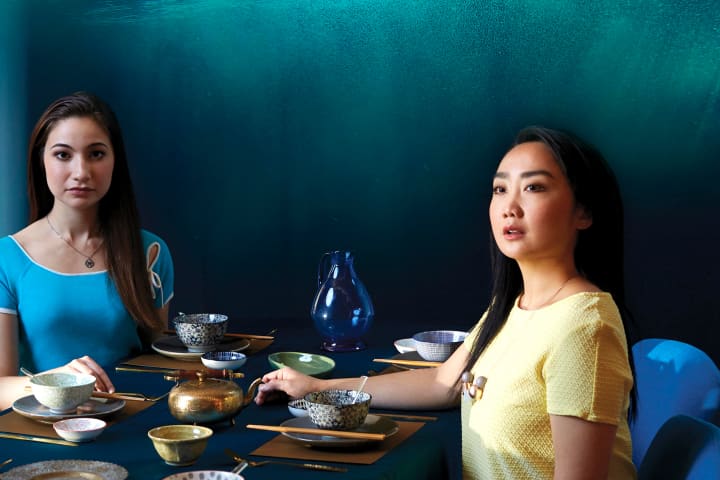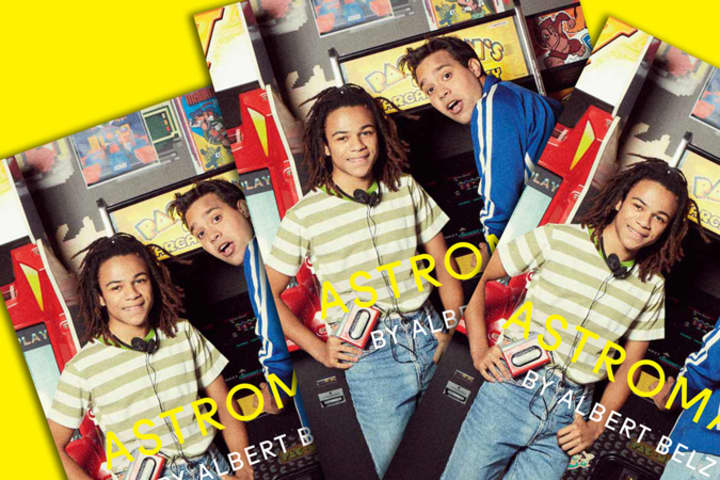Jean Tong’s play Hungry Ghosts made waves at MTC’s Cybec Electric play readings in 2017. Now her play has been programmed as the 2018 Education Production.
The MH370 disaster. Malaysia’s billion-dollar IMDB scandal. These two events had international ramifications, but for our unnamed protagonist they were earth shattering. When you’re a young, queer Chinese-Malaysian Australian, how do you work out where you belong in the world? Criss-crossing between storylines of the fate of MH370, corruption in Malaysia and the exploration of identity, Hungry Ghosts offers an unconventional take on contemporary life.
When did you first realise that your three parallel stories in Hungry Ghosts could work together in a full length play? Can you tell us about this process?
I’d been interested in 1MDB and MH370 for a while, but couldn’t quite pinpoint what it was about those events that interested me. Then in early 2016 I came across a conspiracy theory about how some individuals involved in 1MDB might have instigated the disappearance of MH370 due to certain passengers’ knowledge about the financial scandal. Something clicked then – the nature of grasping at straws during a tragedy, the scale of the financial operations and volume of assets, my physical distance from home and inability to fully contribute to the discussions that were unfolding about the country’s socio-politics – it fell into place so suddenly. I noticed that the common thread seemed to be a sense of loss, or an inability to speak due to either the suppression or lack of knowledge, or the wistful melancholy for something missing. The writing unfolded from there: the beginning of the process was just me making lists about how these three things were like each other, whether in terms of abstract concepts like loss and distance, or more tangible things like coinciding dates and personal experiences of flying with Malaysia Airlines.
What interests you about the exploration of identity in your writing?
I enjoy when identity fluctuates: I think people are increasingly discovering highly specific ways of identifying themselves and figuring out how to talk about the way they experience the world. However, I’m really interested in the outliers of these categories – when and why do these labels fail, and what other expectations come with those new identities or categories? Language is intoxicatingly powerful, but incredibly slippery: who are we with it, and who are we without it? I hope that my writing opens up some spaces on all of those levels – finding the words to say who we are, but also realising that those words may not (and should not) always be able to dictate who we are.
What are the overarching themes in this new play?
It’s about belonging and non-belonging, the terse relationship between desire (wanting something) and greed (wanting everything), collective group identity (family and nationhood).
Do you think the disappearance of MH370 and the 1MBD crisis have affected the national psychology of Malaysia?
I’m not sure if there was a distinctly cohesive national psychology prior to those events, but fingers crossed that in the aftermath of 1MDB and the US Department of Justice’s ongoing investigations, people feel less politically indifferent because it seems like even our most well-protected politicians might actually be held accountable for their corrupt and criminal behaviour on a global scale. More negatively, it may also have really doubled down on eroding the public’s trust in government, and in the power of leadership in changing things for the better.
What advice would you give to young people hoping to emulate your early writing success?
Don’t write for ‘success’. Write because you have something you need to say and write it the best way you need that said. Listen closely to people who’ve been around longer because they know what they’re talking about, but argue hard for your own work – what do they say that makes you prickle not because your ego’s been bruised, but because of your excitement about having found a different way of doing it that might work. Then try it. And then come give me advice about that.
What are you looking forward to about Petra Kalive’s direction of your play?
Everything. She’ll be able to hone some of my more conceptual ideas down to something that’s integrated with the physicality of the actors onstage, and I’m excited to see how she’ll make sense of the whole play on the floor. The questions she’ll ask during developments and rehearsals will tell me a lot about the play, and the answers she’ll bring to some of those questions will be more interesting than anything I could come up with. She’s incredible to work with – she’s one of the warmest people I’ve ever met, but she’s absolutely razor sharp about what the play is actually doing, so I don’t expect to get away with much.
This will be your debut production with a state theatre company – what does that mean to you?
On a personal level, it’s all pretty surreal – in retrospect I’ll look at it as a really significant moment in my life, but currently I still haven’t quite wrapped my head quite around it all. I’m also kind of trying to not think about it too much, and to just focus on developing the play.
At a professional level, the opportunity to present this play with all its form-strange little bits and subject matter as part of a state theatre company will easily be one of my most rewarding experiences in terms of getting access into seeing how different demographics (moving away from independent and student theatre) respond to my work.
Hungry Ghosts comments on how we (as a society) respond in the face of disaster – is this something you care a lot about?
I think crises are a great indicator for who people are and what they value. Debord talks about the ‘Society of the Spectacle’ and I find that very compelling – we’re increasingly able to watch major events unfold live, often from a great distance where we can only offer limited assistance, if any. There’s a major rift in the amount of knowledge we have about disasters, and our capacity to intervene. This feels particularly acute when those disasters involve people or places we’re close to emotionally, but are incredibly distant from physically. I was really drawn to the conversations around MH370 as a major aviation disaster, but the lack of knowledge around the situation meant there wasn’t any ‘right’ way to talk about it. This friction, this unnameable sort of helpless horror feels like something that’s only becoming more and more relevant, and I wanted to pick at that ugly but understandable voyeurism and make that helpless grasping at answers that don’t exist more apparent. What stories do we tell ourselves about major events, catastrophes, accidents, and conflicts in order to understand them and our place amongst them? What does the way in which we do that say about who we are as people?
Do you have any writing habits or rituals you could share with us?
I wrote most of the first draft of Hungry Ghosts either angry or physically agitated – I did a lot of aimless wandering in little circles around my apartment and couldn’t really write more than two or three frenetic pages at a time. I think that was really clear in earlier readings of the play – the energy of the show was often confined to individual scenes, and there’s a punchiness/snappiness to many of the lines.
What do you love about writing for the stage?
I find the restrictions to what can be done live incredibly freeing. I think audiences intuitively accept the relationship between the performer and themselves – that sharing of space and that liveness of any moment. I feel like you can get away with pretty much anything because the audience, (bless them), has willingly entered into a temporary social agreement about the stage as a site with which they want to be actively engaged. The offers you can make to them in those moments can feel a little murky and doubtful in terms of longevity, but it can be magical and transformative there and then.
What are you currently working on?
I’m working with an incredibly talented team to present Romeo is Not the Only Fruit, an original lesbian musical, later in 2017. We’re borrowing from a bunch of favourite heterosexual canonical romances, and turning those narratives into a satirical romp with a queer, women-of-colour slant (pun fully intended). We’re revamping the show from early 2017, but it’s still the first musical I’ve ever worked on, so I’m stretching my skills in a very new, absurdly different direction.
Do you have any long-term playwriting goals you could share with us?
To one day look back and feel like I’ve made work that actually spoke to the society I was making it for, or challenged something that’ll hopefully no longer be relevant. And to be able to accept that those works have outlived their use, but still have the energy and commitment to keep creating new work.
What is your favourite part of the theatre-making process?
The first time the words are read aloud by a cast – seeing the words come off the page through the bodies of engaged, generous, and funny people is a gorgeous moment.
What do you find most challenging about completing a new work?
Figuring out when it’s ‘ready’ – for the first development, first rehearsal, first preview – and just letting the past work do its job in that moment before trying to move further forward.
Anything you’d like to add about your play Hungry Ghosts?
Working in other languages simultaneously and trying to find the right words when not everyone in the room is multilingual has been chaotic and rewarding. And there’s something about being able to find the limits of what each language can best encapsulate, and then make the leap into another language and keep going, that feels really hopeful in terms of being able to language a variety of experiences.
Published on 28 August 2017





